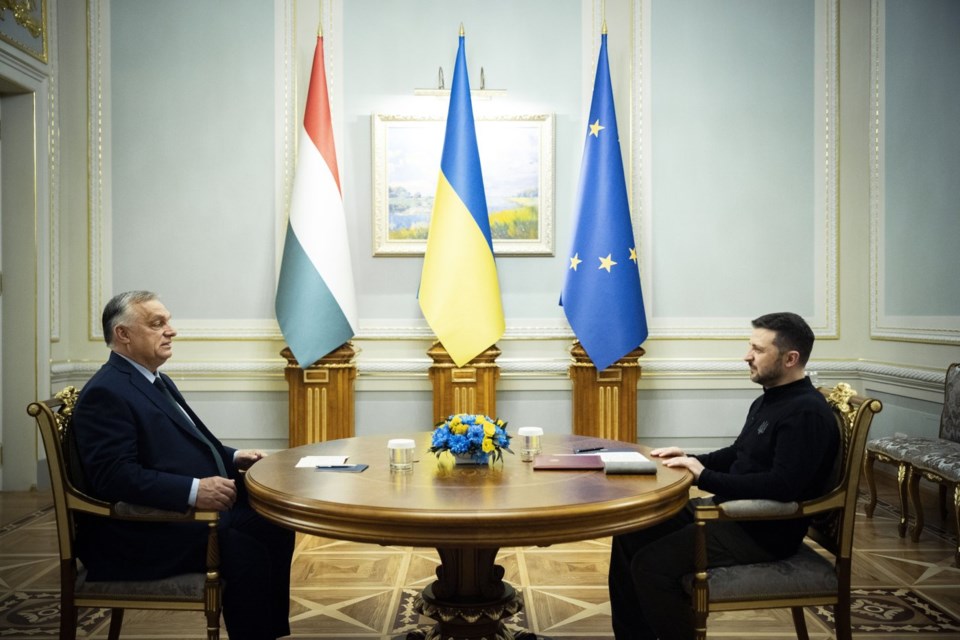KYIV, Ukraine (AP) — During his first visit to neighboring Ukraine since Russia's full-scale invasion, Hungarian Prime Minister told President Volodymyr Zelenskyy Tuesday that the ongoing war was “the most important issue for Europe.”
Known as Russian President , Orb√°n's visit was a rare gesture in a tumultuous relationship between the two countries as Budapest has repeatedly broken ranks with the rest of the European Union and leaned toward Moscow.
The Hungarian prime minister has routinely EU efforts to extend assistance to Ukraine and to sanction Moscow over its war, frustrating both Zelenskyy and other EU leaders.
Meanwhile, on the war’s front line, Kyiv’s forces are scrambling to hold at bay in eastern Ukraine. Delays in the provision of crucial Western military aid left the Ukrainian army at the mercy of the Kremlin’s bigger and better-equipped forces.
In a sign of still frosty relations, Zelenskyy did not publicly acknowledge Orbán’s visit until hours after his arrival, posting on social media platform X that the two had discussed trade, cross-border cooperation, infrastructure and energy.
However, the Ukrainian president’s office released a video showing Zelenskyy thanking Orbán for his visit and welcoming him to the country after shaking hands and then sitting across from each other at a round table with Hungarian, Ukrainian and EU flags in the background.
The two countries have had a tense relationship since the war started with Orbán portraying himself as a champion for peace and calling for an immediate cease-fire and peace talks without expanding on what that would mean for Ukraine’s territorial integrity.
This visit comes the day after Hungary of the EU, a position that has little real power but can be used to set the tone of the bloc’s agenda. Hungarian officials have indicated that they will act as “honest brokers” in the role despite worries from some EU lawmakers that Hungary’s democratic track record makes it unfit to lead the bloc.
Orbán’s press chief, Bertalan Havasi told Hungarian news agency MTI early Tuesday the meeting would be an opportunity to build peace as Ukraine fights off Russia’s invasion.
During his visit, the Hungarian prime minister told Zelenskyy: “This is war and peace, war between Russia and Ukraine, the invasion of Russia against Ukraine.” He added that the war “is the real issue. My target is to be here to understand how we could be helpful to Ukraine in the forthcoming six months.”
The Hungarian premier, a self-described adherent of “illiberal democracy,” has long been accused by his European partners of dismantling democratic institutions at home and acting as an obstinate spoiler of key EU policy priorities. The bloc has frozen more than $20 billion in funding to Budapest over alleged rule-of-law and corruption violations, and Orbán has conducted numerous anti-EU campaigns depicting it as an overcentralized, repressive organization.
Orbán has also long in Ukraine’s western region of Zakarpattia, a community he has used to justify his refusal to provide weapons to Ukraine or allow their transfer across the two countries’ shared border.
His visit comes as he seeks to recruit members into a new nationalist alliance that he hopes will soon become the largest right-wing group in the European Parliament. On Sunday, Orbán met in Vienna with the leaders of Austria’s far-right Freedom Party and the main Czech opposition party, announcing the formation of the new group, “Patriots for Europe."
The trio would need to attract lawmakers from at least four more EU countries to successfully form a group in Europe's new parliament, which held elections in June. Right-wing nationalist parties across Europe strengthened their position in the elections, but ideological differences over the war in Ukraine and cooperation with Russia have often prevented deeper alliances among some of the parties.
___
Spike reported from Budapest, Hungary.
Justin Spike And Illia Novikov, The Associated Press




